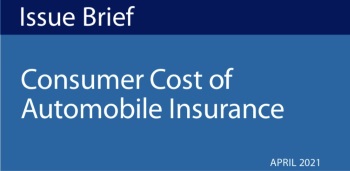Casualty Quarterly, Summer 2021
 |
|
Summer 2021
VOL 5 | NO 2 |
Q&A—Workers’ Comp, Opioids, and COVID-19

JonesThe Academy’s Workers Compensation Committee is looking at the issue of the potential impacts of COVID-19 on the opioid epidemic. The opioid epidemic has been a public health issue for most of this century—before, during, and potentially after the COVID-19 pandemic. Casualty Quarterly did a Q&A with Derek Jones, a member of the committee who is leading some of its efforts on the issue.
The opioid epidemic has been in the news the last decade and many are well aware of the dangers of opioid addiction. How did the opioid epidemic affect the workers’ compensation space prior to the COVID-19 pandemic?
The opioid epidemic has added significant cost to the workers’ compensation system. Many injured workers developed addictions to opioids, which delayed a successful return to work and increased indemnity costs. Perhaps more significantly, opioids drove an increase in the medical spend for workers’ compensation—opioids represent a large portion of medical costs as the cost of a claim with opioid prescriptions is much higher than a claim without opioids.
There are “before, during, and after” timelines of the opioid epidemic vis-à-vis the COVID-19 pandemic. Where are we now, or even later this year—are we moving from COVID to post-COVID?
We are definitely moving into the post-COVID period, but we are not fully there yet. COVID-19 variants—most notably the Delta variant—continue to emerge and have added uncertainty for employers and workers about when it will be truly safe to return fully to “normal operations.” In recent months, however, we have seen increased access to many key health care resources (e.g., drug and alcohol rehabilitation facilities) that help to reduce opioid dependency.
Some states have proposed or enacted legislation to expand the presumption of benefits, which it states represents a significant potential exposure for insurers, as the cost of the COVID-19 claims was not explicitly considered in premium policies that cover 2020 claims. Can you expand on or summarize this?
Presumption laws are intended to facilitate workers’ compensation benefits for certain workers. The recent legislation was aimed at protecting first responders, whose work is so critical for the public good—if a health care worker contracted the coronavirus, it is presumed they became sick on the job and thus should receive workers’ compensation benefits. Pandemic losses were not reflected in the past claims experience used to determine workers’ compensation rates for 2020, so a concern for insurers is that pricing for policies effective in 2020 would not reflect a sufficient provision for this exposure.
There’s been a noted increase in telemedicine during COVID-19, and the attendant increases in potentially more opioid prescriptions as a result of social-distancing measures. What’s the outlook for telemedicine related to opioids looking forward?
Historically, health care providers were not permitted to prescribe controlled substances via telemedicine. During the COVID-19 public health emergency, authorized prescribers were allowed to prescribe controlled substances via telemedicine, without the need for an in-person medical visit. However, data is emerging that 2020 will be a challenging year for opioid overdoses, likely erasing much of the recent progress we have seen from the CDC in terms of declining overdose deaths. Looking forward, telemedicine presents an opportunity to increase access for injured workers to medication-assisted treatment (MAT), which has been shown to be very effective in reducing the risk of death from opioid abuse.
Can you offer anything in particular actuaries could do, in their practice or via Academy volunteer work?
Actuaries can continue to build models used to predict which claimants reflect the greatest risk of developing opioid use disorders—this information can be used by the claims department and the actuarial reserving team to determine appropriate reserve estimates for financial reporting. Identifying the trends in claim frequency and severity will also help in both reserving and pricing exercises. More broadly, actuaries who collaborate in groups such as the Academy’s Workers’ Compensation Committee can review trends and highlight recent developments to reinforce or redirect efforts intended to reduce the impact of opioids on the workers’ compensation system.
Automobile Insurance Committee Releases Brief
 The Automobile Insurance Committee released an issue brief on the development and pricing of automobile insurance.
The Automobile Insurance Committee released an issue brief on the development and pricing of automobile insurance.
Key points from the issue brief include:
- increased availability of data and technology has advanced pricing sophistication over the years, resulting in lower premiums paid by many consumers.
- consumers can impact the price they pay for automobile insurance based on factors such as how safely they drive, deductibles they select, or types of automobiles they operate.
Committee Comments to Treasury, FIO
The Automobile Insurance Committee also sent comments to the U.S. Department of the Treasury and the Federal Insurance Office’s (FIO) request for information regarding FIO’s future work relating to monitoring the availability and affordability of automobile insurance.
Academy Statement Regarding CAS Rescinded Ratemaking Principles
Following a Casualty Actuarial Society (CAS) statement in early April regarding the CAS Board’s response to their members’ and regulator feedback on their decision to rescind the CAS Statement of Principles on Ratemaking, Academy President Tom Campbell issued an Academy statement, noting the “Academy has issued and will continue to produce resources that will be useful to our members, the regulatory community, and the public that touch on P/C insurance ratemaking considerations, such as bias in data, assumptions, and models”—but that practice notes are “not intended to provide interpretations of actuarial standards of practice, nor are they meant to be a codification of generally accepted actuarial practice.”

CavanaughCPC, Life Practice Council Comment to NAIC Special Committee
Lauren Cavanaugh, vice president, casualty, and Laura Hanson, vice president, life, co-presented verbal comments to the NAIC’s Special (EX) Committee on Race and Insurance regarding proposed charges being considered by the committee. Their remarks addressed property/casualty and life workstream concerns addressed in comment letters previously submitted by Academy President Tom Campbell in May.
Academy Assists NAIC in CASTF Predictive Analytics Series
Academy volunteers and staff facilitated development of the presentations for a virtual education series sponsored by the NAIC’s Casualty Actuarial and Statistical Task Force (CASTF) in June. The seven sessions were part of CASTF’s Predictive Analytics “Book Club” series held in late June in conjunction with the NAIC’s Insurance Summit to facilitate regulator training and the sharing of actuarial expertise on data analytics and the use of complex models. Presentation topics included catastrophe modeling, ethics in analytics, big data and modeling, regularization methods, generalized additive models, tree-based models, and territory methods.

SlotzickLisa Slotznick Named COQ Vice Chairperson
Lisa Slotznick, a past Academy vice president, casualty, is the new vice chairperson of the Committee on Qualifications (COQ), to assist Chairperson Katie Campbell. Slotznick—a 2015 recipient of an Academy Outstanding Volunteerism Award—has been serving as a member of the COQ and is a member of the Actuarial Standards Board’s ASOP No. 41 Task Force.
P/C RBC Committee Presents to NAIC
David Traugott, chairperson of the Academy’s Property and Casualty Risk Based Capital (RBC) Committee, presented an update on P/C RBC underwriting factors experience to the NAIC’s P/C RBC (E) Work Group. The presentation included time management, context for the report, results, methodology, and analysis of change. Traugott also provided a status report to the NAIC’s P/C RBC (E) Work Group at the group’s July 22 meeting.
COPLFR Comments to NAIC Blanks Committee
The Committee on Property and Liability Financial Reporting (COPLFR) sent a comment letter to the Casualty Actuarial and Statistical (C) Task Force on proposed changes to P/C annual statements. The letter addressed such areas as definition of exposure, calendar date alignment, and existing alternative data sources. COPLFR Chairperson Derek Freihaut provided brief verbal summary of the letters during the Blanks Working Group call on July 22.
ACI Down Slightly in Latest Five-Year Average
 The Actuaries Climate Index (ACI) five-year moving average fell for the first time since 2017, according to the latest release that includes fall 2020 data. The five-year moving average now sits at 1.22 relative to an average of zero during the 1961–1990 reference period.
The Actuaries Climate Index (ACI) five-year moving average fell for the first time since 2017, according to the latest release that includes fall 2020 data. The five-year moving average now sits at 1.22 relative to an average of zero during the 1961–1990 reference period.
“The five-year average declined because the latest seasonal measure of changes in weather extremes and sea level replaced an even higher seasonal value from the fall of 2015 that cycled out of the calculation of the average,” said Doug Collins, chair of the Climate Index Working Group.
The ACI is sponsored jointly by the Academy, the Canadian Institute of Actuaries, the Casualty Actuarial Society, and the Society of Actuaries. Read the news release.
Save the Date—The Academy’s 2021 Annual Meeting and Public Policy Forum will be held on Nov. 4–5 at the Fairmont Hotel in Washington, D.C. The agenda will include practice-specific breakout sessions for all practice areas and plenaries that cover critical issues relevant to actuaries in all practice areas, along with opportunities to discuss these issues directly with policymakers, subject matter experts, and Academy leaders. Registration will open in August.
Academy Annual Volunteer Survey Deadline: July 30—The Academy’s Annual Volunteer Survey is your chance to raise your hand and serve the profession. If you would like to join your colleagues in volunteering at the Academy, please take the survey by logging in to the member section of the Academy website. The survey will close on July 30. If you have any questions about volunteering or the survey, please contact the Academy’s director of membership, Kasha Shelton, by email at volunteersurvey@actuary.org.
Is Your Academy Member Profile Up to Date?—Collecting, maintaining, and analyzing various demographic information allows the Academy to better understand its membership specifically and the U.S actuarial profession in general. In recent years, the Academy has expanded the type of information requested and compiled, including allowing members to add another area of practice to their profile, ethnicity, and specializations within their practice area. If you haven’t updated your member profile recently, please take a few minutes to make sure your information is current by visiting the “Update My Profile” section of the member section of the Academy website to review and add this optional additional information. If you need assistance in reviewing, updating, or adding specific demographic information to your Academy member profile, contact membership@actuary.org.
In This Issue
- Q&A—Workers’ Comp, Opioids, and COVID-19
- Automobile Insurance Committee Releases Brief
- Academy Statement Regarding CAS Rescinded Ratemaking Principles
- CPC, Life Practice Council Comment to NAIC Special Committee
- Academy Assists NAIC in CASTF Predictive Analytics Series
- Lisa Slotznick Named COQ Vice Chairperson
- P/C RBC Committee Presents to NAIC
- COPLFR Comments to NAIC Blanks Committee
- ACI Down Slightly in Latest Five-Year Average
- Academy Member Activity
- Legislative/Regulatory Activity
- In the News
Legislative/Regulatory Activity
Following is a roundup of state and federal P/C legislative and regulatory activity related to COVID-19, wildfires, and other P/C-related issues.
State Activity
Actuarial Qualifications
Louisiana Gov. John Bel Edwards signed House Bill 576, which provides for definitional qualification of property and casualty independent actuaries. The new law changes the requirement of the independent qualified actuary from an individual who is a member in good standing of the American Academy of Actuaries or the Casualty Actuarial Society to an independent qualified actuary as defined in the NAIC’s Quarterly and Annual Statement Instructions.
Auto Insurance
Arizona, Kansas, Nevada, Oklahoma, and Virginia all passed legislation governing the operation of and insurance requirements for peer-to-peer car-sharing programs. The bills establish liability and insurance requirements for these programs, define underwriting requirements for insurers, and establish general guidelines regarding the operation of peer-to-peer car-sharing programs, among other provisions.
Catastrophe
Louisiana Gov. Edwards signed Louisiana Senate Bill 42, requiring notices of casualty policy reinstatements to go to all relevant parties. Insurers reinstating an insurance policy providing casualty coverage after they cancel it are now required to issue notice of this reinstatement to every policyholder or person who received the notice of cancellation. The bill takes effect on Jan. 1, 2022.
North Dakota Senate Bill 2077 imposes a monetary penalty on insurance companies that fail to report data relating to premiums to the state insurance commissioner. An insurance company that fails to report fire, homeowner’s multiple peril, or commercial multiple peril insurance premium collections, among others, is subject to a penalty of $100 per day. Additionally, the state insurance commissioner may revoke or suspend the certificate of authority of an insurance company that does not file the premium collection form.
Data Security
Maine Gov. Janet Mills signed Legislative Document 51 (House Paper 17), the “Maine Insurance Data Security Act,” which establishes definitions for data security and the investigation of cyberattacks. The law authorizes insurers licensed in the state to develop and maintain a security program to protect consumer information and their own information systems. The program must protect against reasonably foreseeable threats to insurer’s information, protect against unauthorized access to this information, and periodically reevaluate a schedule to retain consumer information and provide a mechanism for its destruction when it is no longer needed. The new law also requires insurers to notify the Maine Bureau of Insurance Superintendent in the event of a cybersecurity breach of their information systems, and requires insurers to conduct an investigation into the nature and scope of the cybersecurity event, identify nonpublic information that may have been involved in the breach, and take necessary steps to restore the security of the information systems compromised.
Flood Insurance
Iowa Gov. Kim Reynolds signed Iowa House File 583 into law. The measure relates to private flood insurance which included certain repeal provisions. Flood insurance rates will not be subject to prior approval by the state commissioner. Rather, insurers must attest that flood insurance rates are based on actuarial data, and guidelines that are not excessive or inadequate.
Marijuana
New Jersey Gov. Phil Murphy signed Assembly Bill 21, which legalizes possession and personal use of marijuana and requires those interested in operating a cannabis business to obtain liability insurance coverage. It also requires cannabis delivery companies to maintain current hired and non-owned automobile liability insurance sufficient to insure all vehicles used for delivery in the amount of not less than $1 million per occurrence or accident.
Medical Malpractice Insurance
New Mexico Gov. Michelle Grisham signed House Bill 75, eliminating hospitals from the list of providers eligible to obtain medical malpractice insurance coverage under the Medical Malpractice Act (MMA). Under current state law, the MMA pays a significant portion of hospitals’ medical malpractice liabilities through the “Patient’s Compensation Fund” but limits the number of times a provider can use the fund to three occurrences of malpractice per year. The bill eliminates hospitals from the list of eligible providers because of numerous instances in which the New Mexico Office of the Superintendent permitted hospitals to use the fund for an unlimited number of malpractice occurrences each year.
Medical Professional Liability
New York Gov. Andrew Cuomo signed a bill repealing Article 30-D of the Public Health Law (the Emergency or Disaster Treatment Protection Act). The article immunized nursing homes and other health care facilities from civil liability for negligent acts or omissions committed during the COVID-19 pandemic. COVID-19-related claims against health care providers will now be litigated as typical malpractice cases.
Personal Injury
Virginia Gov. Ralph Northam signed Senate Bill 1241, relating to the disclosure of insurance policy limits with personal injury claims. The bill provides that, in a civil action for personal injuries sustained from a motor vehicle accident, an insurance company must disclose the policy limits of an alleged tortfeasor who has been charged with an offense of driving under the influence within 30 days of a request for such disclosure.
Real Property
Gov. Northam also signed House Bill 1824, which adds to the required disclosure statement directing a buyer to beware and exercise necessary due diligence in determining the condition of real property or any improvements advising the buyer to obtain a mold assessment conducted by a business that follows the guidelines provided by the U.S. Environmental Protection Agency.
Regulatory
Texas Gov. Greg Abbott signed a bill exempting specialty business insurance products and most transactions negotiated by larger businesses from certain regulatory filing and review requirements. Per the Texas Legislature, the measure would help facilitate more robust insurance product offerings by exempting businesses from certain regulatory requirements, which they claim can limit the range of product choice by discouraging new market entrants.
Risk-Retention Groups
Oklahoma Gov. Kevin Stitt signed Senate Bill 1035, which updates definitions for risk-retention groups chartered in Oklahoma. The measure requires all risk-retention groups chartered in the state to file with the Oklahoma Insurance Department and the NAIC. Previously, chartered risk retention groups were only required to write liability insurance pursuant to the insurance laws of Oklahoma.
Travel Insurance
South Carolina Gov. Henry McMaster signed a bill amending provisions related to travel insurance. The bill authorizes the director of the Department of Insurance to issue a Limited Lines Travel Insurance Producer License, assess a premium tax on travel insurance premiums, and establishes certain requirements for travel protection plans, among other provisions. Gov. Brian Kemp signed similar legislation in Georgia. House Bill 205 amends Georgia State Code to provide a framework for regulating the offering or issuance of travel insurance.
Unemployment
Massachusetts bill H 90 would provide for a program for improvements to the Massachusetts Unemployment Insurance Trust Fund and allocates $7 billion in funds toward relief to employers in the state. This sum is to be used to reduce the amount of the advance from the federal government or repay these federal advances made to the state for fiscal years 2020 to 2025.
A Northwest Herald (Ill.) story cited analysis of the National Flood Insurance Program’s financial condition from the Academy monograph, The National Flood Insurance Program: Challenges and Solutions.
The Academy’s Insurance Journal.
The French-language Canadian insurance publication Porteil de L’Assurance reported on the latest data release of the Indice Actuariel Climatique (fr) or Actuaries Climate Index (eng).
A Cyber Wire briefing cited the Academy’s paper on cyber breach reporting requirements, which provides a systematic comparison of the existing regulations with respect to data breaches involving personally identifiable information across the states.
|
Copyright © 2021 American Academy of Actuaries. All Rights Reserved. |
 Phone: 202-223-8196
Phone: 202-223-8196